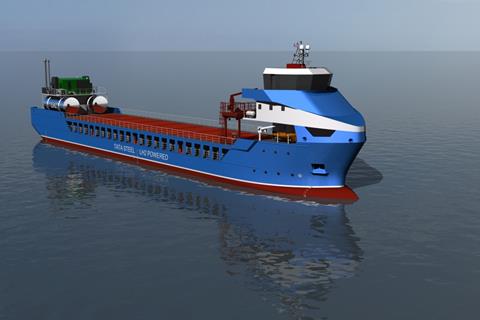A partnership has been formed between the steel industry and a Dutch shipowner to develop a hydrogen-powered vessel for the short-sea trade.
Groningen-based consultancy Conoship International is lending its design and technology expertise to the project, initiated by Tata Steel with Van Dam Shipping.
The envisaged vessel type would have a loading capacity of approximately 5,000t, and the adoption of propulsion plant with the capability to operate on liquefied hydrogen fuel would serve corporate goals of CO₂emissions abatement.
Tata Steel, whose European assets include the IJmuiden production complex on the Netherlands’ North Sea coast as well as the Port Talbot complex in Wales and a number of rolling mills in the UK, is looking to reduce the carbon footprint attributable to the trade it generates in shipments of steel coils. The scheme advanced with Van Dam complements a wide-ranging plan implemented with the aim of ‘greening’ the steelmaking process at IJmuiden, which already ranks as one of the leading plants worldwide in terms of low-emission production.
The IJmuiden works, where Van Dam’s coasters regularly take on loads, has capacity for around 7.5m tonnes of hot- and cold-rolled coil per annum.
The ultimate aim of running the nascent vessel wholly on hydrogen would save an estimated 3,000t of CO₂emissions every year compared to a similar sized ship burning fuel oil and gas oil. It is anticipated that the collaboration will open the way to more sustainable shipping from 2024 onwards.
Located in Groningen Province at Spijk, near Delfzijl, Van Dam Shipping currently deploys eight dry cargo vessels in the short-sea market, of which six are suited to navigation of the Saimaa Canal and Finnish lakes system.
The company’s progressive disposition towards new solutions was earlier expressed in the retrofit of modular Ventifoil sail units to the 3,600dwt coaster Ankie. The installation formed part of the EU-funded Wind-Assisted Ship Propulsion (WASP) research project.
Hydrogen powering has as yet been mainly confined to the small ferry and inland vessel sectors, although a Norwegian plan is in hand for a coastal minibulker equipped to run on ‘green’ hydrogen in combination with rotor sails.






